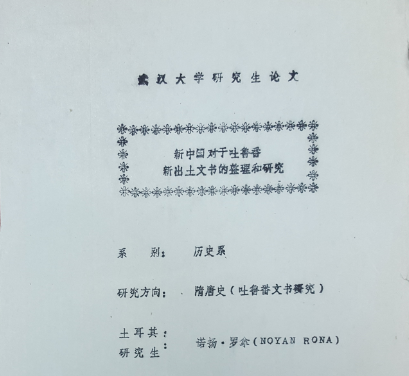
2018-9-7 08:47:29
From:english.eastday.com
Wu Qiong
Noyan Rona’s unceasing devotion to Shanghai’s development
In the 1980s, due to the ban on foreign currency circulation in China, RMB and foreign exchange certificates were used on the market. As Noyan noted, at KFC, customers stood in two lines. One line was made up of Chinese people holding RMB notes, while the other consisted of foreigners holding foreign exchange certificates. With a foreign exchange certificate, people could buy imported and scarce goods in licensed stores. As a government-sponsored foreign student, Noyan was granted a privilege card with which he could use both RMB and the foreign exchange certificate. He still has a 10-yuan RMB note, which was the largest face value of Chinese money at that time.

(Cover of Noyan’s postgraduate thesis)
After graduating from Wuhan University, Noyan worked for the Turkish Ministry of Foreign Affairs, the Turkish Embassy in China and then the Turkish Consulate General in Shanghai. In 1999, he joined Turkey’s second largest bank, Garanti Bank, as Chief Representative of the bank’s Shanghai office. Garanti Bank is the first Turkish bank which set up a representative office in China after China launched the reform and opening up policy in 1978, as it was believed that Shanghai, as China’s financial, industrial and service center, was full of potential. And it has since proved that the bank made the right decision. As Noyan put it, the financial market back in 1999 was like a flower bud; waiting to be developed, but not open enough. However, thanks to the relaxation of policies, foreign banks are now less restricted. They can even open branches and register local banks in China. “Now, Shanghai is nothing short of an international financial center,” said Noyan.
